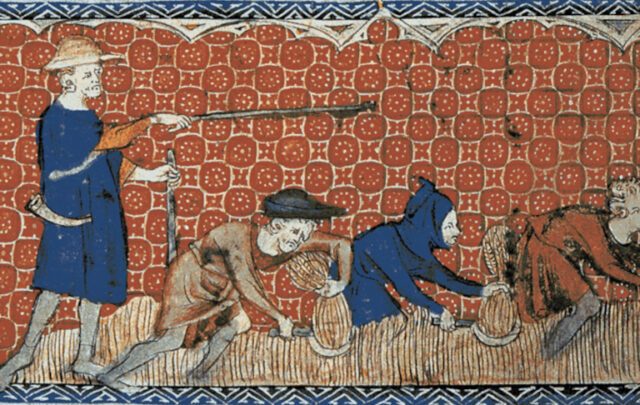Some nice Yankees up in Vermont are ready to go all Stonewall Jackson on the United States. Peacefully, of course. Photo: ohiorepublic.blogspot.com.
For one of America’s smallest states, Vermont has a lot to teach the rest of the country about living locally.
It’s always had the local democracy of the New England town meeting. Now Vermont is getting attention for a thriving local food economy of small farms, great farmers markets and food entrepreneurs exporting everything from organic seeds to local tofu. And in the future, the Second Vermont Republic may lead all other U.S. states in declaring complete local sovereignty.
Seceding from the Union, that is.
Rebel yelp
In my part of the country, the South, people talk about the surrender of Fort Sumter as if it happened last month and still hang portraits of Robert E. Lee in their dining rooms.
So down here below the Mason-Dixon, we remember what happened the last time that American states tried to secede from the Union. It didn’t work out so well. And given slavery, Southern secession probably didn’t deserve to work out any better than it did.
By contrast, for two centuries Vermont has been such a modest, self-reliant place that perhaps it deserves to determine its own destiny, legally, in the tradition of the Declaration of Independence and in accord with the U.S. Constitution.
Like Texas, Vermont was a republic before it was a state. When Vermont under Ethan Allen declared its independence from Britain around the same time as the 13 united colonies, instead of joining them, Vermont decided to go its own way. But unlike Texas, the Vermont Republic’s 1777 constitution outlawed slavery. For 14 years, the small farmers of Vermont ran their own nation, only joining the Union under pressure in 1791.

-
Most Likely To Secede: What the Vermont
Independence Movement Can Teach Us about
Reclaiming Community and Creating a
Human Scale Vision for the 21st Century
edited by Ron Miller and Rob Williams,
Chelsea Green, 264pp, $19.95.
Judging by Most Likely to Secede: What the Vermont Independence Movement Can Teach Us about Reclaiming Community and Creating a Human-Scale Vision for the 21st Century, a collection of essays edited by Ron Miller and Rob Williams, the Second Vermont Republic would be about as un-Confederate a rebel as you can imagine, a disarmed nation with green hills covered in solar panels and populated by farmers market vendors whose main export would be organic kale.
Un-American Exceptionalism
Last time I checked, in Burlington they still speak American English, still watch CNN and still swap Taylor Swift videos with friends on Facebook. Even so, perhaps more than any other U.S. state today, Vermont appears to be largely still itself.
Ironically, its long-time poverty and status as a backwater may have protected Vermont’s uniqueness against the onslaught of post-War development. As Frank Bryan put it in his contribution to the book, “Vermont had been ‘left behind.’ This turned out to be a blessing.”
Tiny, hardscrabble Vermont didn’t just lack a coastline. It also offered little that anybody from the outside would want — neither oil, nor uranium nor land ample enough for large commodity farms. No resource curse there. And little interest in shopping malls.
Meanwhile, since World War II, other states became more like Long Island or Orange County, California, with billboard-flanked freeways connecting sprawling suburbs of big box stores and corporate office parks.
So if any other state were to try to secede from America, it would have to secede from itself too. Because after seventy years of consumer capitalism making every state look almost just like every other state, outside of a bit of local color for the tourists of course, these days there’s very little local identity for any state to secede to.
After all, you won’t find any special Gone-with-the-Wind charm in a Chick-Fil-A in Atlanta any more than you’ll encounter much Down East Yankee grit at a Chick-Fil-A in suburban Boston.
Vermont may just be the one exception to the homogenization of America. And if Vermonters were to lower the Stars and Stripes, Vermont’s still vibrant local culture gives it a good chance to succeed as a healthy, happy and free small nation along the lines of Switzerland or Sweden.
And Miller and Williams’s book makes a case that, because recently America seems to have finally discovered the Green Mountain State, continued Union occupation represents a clear and present danger to Vermonters’ cherished autonomy. This is especially clear on the energy front, where Washington-enabled crony capitalism has allowed a Canadian company to take much of Vermont’s ample hydroelectric power for export and where the Vermont Yankee nuclear power plant, run by New Orleans-based Entergy, continues as an issue of contention inside the state.
Secession is a state of mind
“The impossible often has a kind of integrity to it which the merely improbable lacks,” said Douglas Adams.
Even if few people outside of Vermont (and Texas of course) talk about seceding from the Union these days, perhaps the idea of secession can be useful to people in other states who care about climate hell, peak oil and financial crisis — all world problems for which the United States is disproportionately to blame.
Maybe, for instance, you live in Chicago but can’t imagine Illinois ever mounting a serious secession movement. But that need not stop you from developing a secession state of mind. For example, this would mean avoiding the temptation to take pride in empire or trying to live as much as possible on food grown inside the state, all while asking your friends the question that some Vermonters are asking:
If your state weren’t already part of the U.S. today, would you want to join?
Answering “no” may not make you want to start a petition drive to set up a local republic, but it may help you start to question the alleged benefits of rule from Capitol Hill, and indeed even the inevitability of belonging to the American Union.
Progressives and environmentalists have already tried everything else. They’ve occupied Wall Street, held tea parties and, again and again, they’ve thrown the bums out of Washington, only to see even worse bums take their place.
Meanwhile, the unholy alliance of big government and big corporations has continued to wreck what’s left of our republic. In the age of super PACs, if you don’t want the government spending your tax dollars on drones to assassinate goat herders in Yemen or bullying Poland into hydrofracking all while forcing every farmer in America to plant Monsanto Bt corn, your options seem to be running out.
When all else fails, why not just quit America, if only in spirit?
But James Howard Kunstler, in his contribution to Most Likely to Secede, gives an even better reason to start thinking about your state as its own little nation now, even if that seems preposterous:
I’m personally not an advocate of national breakup or secession. I grew up with the United States and I have been, until recently, pretty comfortable with the idea that we would stick together no matter what. But in the Long Emergency all bets are off for politics, economics, and social cohesion. Turbulence will be the rule, and we will have to do our best to make sure that the just prevail over the wicked, and that the weak are not trampled, and that the best that was in us as a people can somehow be rescued from the dumpster of memory.
One of the most original and provocative responses in years to American empire, Most Likely to Secede features other strong essays from revered localist Kirkpatrick Sale and permaculture farmer Ben Falk, who makes a compelling case that chestnut trees are a better investment — on a purely financial basis — than most stocks or bonds, with an annualized rate of return over 50 years of 15.8%.
Aptly, the book opens with Wendell Berry‘s poem, “The Mad Farmer, Flying the Flag of Rough Branch, Secedes from the Union.” Its first stanza makes secession, even on a personal level alone, sound irresistible for a person with any ethics today:
From the union of power and money,
From the union of power and secrecy,
From the union of government and science,
From the union of government and art,
From the union of science and money,
From the union of ambition and ignorance,
From the union of genius and war,
From the union of outer space and inner vacuity,
The Mad Farmer walks quietly away.
– Erik Curren, Transition Voice






